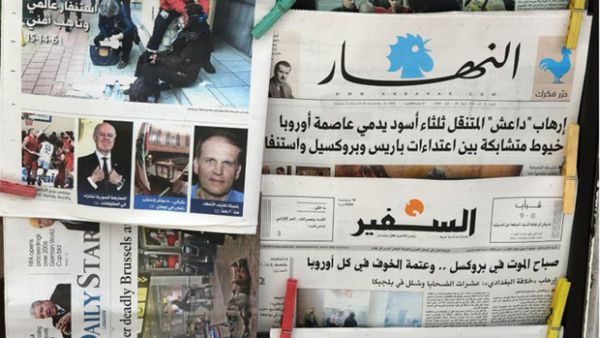Lebanon's Information Minister Melhem Riachi announced Sunday that his ministry was drafting a subsidy plan to support floundering Lebanese media outlets.
The recently appointed minister said the financial difficulties plaguing the Lebanese media were tied to the overall economic circumstances of the country, during an interview with local radio station Radio VDL 100.3.
But, he added, “There is a plan to improve their circumstances.”
Riachi has been consulting with senior journalists to develop solutions for the financial predicament of media outlets.
He is due to meet a delegation of staff from Lebanon’s An-Nahar newspaper Monday to discuss the situation following their alleged arbitrary dismissals without end-of-service benefits.
An-Nahar announced major staff cuts in the last week of December.
Local media reported that between 65 and 120 of their formerly 300-strong staff were laid off, with 50 said to be journalists.
Media outlets in Lebanon have seen prolonged financial instability, especially among print media.
Prominent newspaper As-Safir closed its doors on Dec. 10 after 42 years of publication.
The past year saw a spate of layoffs and reductions in numbers of printed pages at several dailies, leading Lebanon’s Journalists Union to call on the government to devise a plan to save the nation’s newspapers.
The union said “the circumstances ... should be confronted through a comprehensive plan that compels the state to assume its responsibilities regarding the dangerous national crisis,” in a statement in September.
Lebanon has an established reputation for press freedom in the region and having an influential media industry throughout the Arab world. At least 10 newspapers in Arabic, English and French are published daily in the country.
Riachi referenced a previous announcement made Jan. 5 to establish a “media salvation” committee to support newspapers and the passage of a new media ethics law.
“If the owners of [media] establishments reach bankruptcy, a disaster will strike Lebanon. Journalists will find themselves unemployed,” Riachi told media representatives at the time.
The minister also reiterated his intention to transform the ministry into a “dialogue ministry” by changing the nature of the official media arm to one that doesn’t just convey news of politicians’ itineraries and functions, “but rather a ... media [that also] relays citizen’s voices to the officials” he said in an interview with the state-run Radio Lebanon on Dec. 27.
Riachi’s efforts to provide a safety net for the media industry come in response to repeated calls to step in from the Journalists Union.
But the threat facing the country’s newspapers goes beyond Lebanon’s economic struggles. Its newspapers are also subject to a global change in news consumption habits which have seen consumers obtaining information online. Many news outlets are free for the consumer and paid for by online advertising, but this brings in less revenue than print ads and paper sales, and the trend has left many newsrooms unable to cover expenses.









